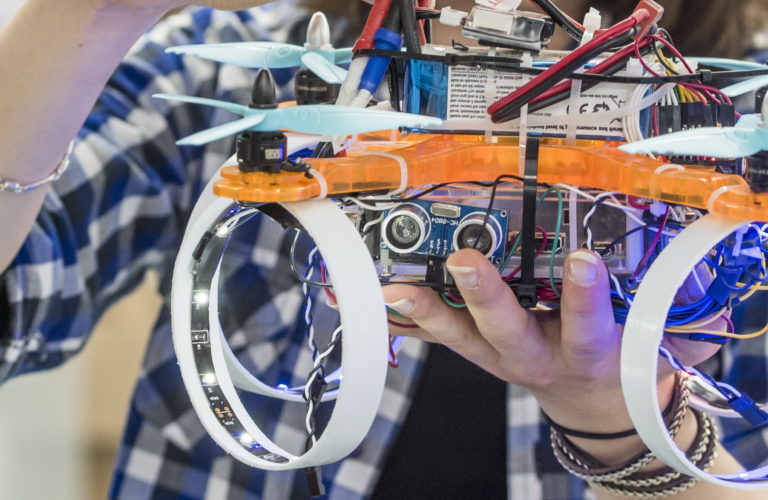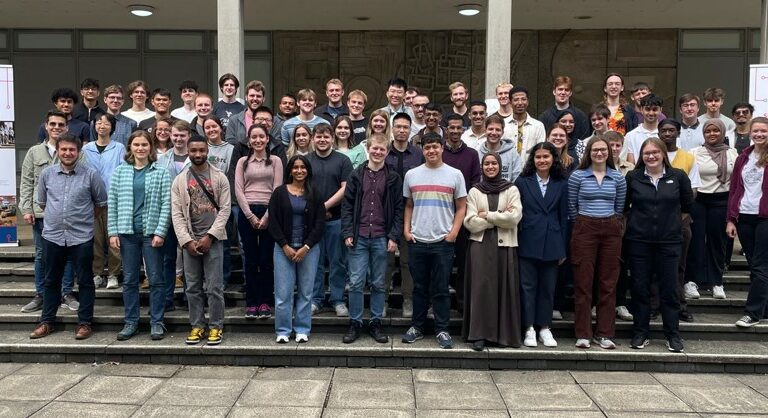“The great thing about electronics, I found, was that every day is a new challenge – and everything is possible. Your voice matters just as much as anyone else’s, because others may have been in the field for longer, doesn’t mean they can see what you can see. That’s particularly important if you’re a minority.” Chi Onwurah MP
The National Semiconductor Strategy, recently published by the Government, makes clear that “we need to inspire the next generation of semiconductor experts that will drive the growth of tomorrow by promoting physics, engineering and electronics“. Therefore, ahead of International Women in Engineering Day (#INWED) and the launch of our Girls into Electronics events programme 2023, we sat down with the inspirational Chi Onwurah MP.
As a black working-class woman from a council estate in Newcastle, Chi Onwurah was in a minority of one studying Electrical Engineering at university in London. She went on to build digital networks all over the world, including the first mobile phone network in Nigeria. Today she is the UK’s Shadow Minister for Science, Research and Innovation. Chi is a supporter of the UKESF and has a particular interest in the Girls into Electronics initiative.
“It’s great to see the work that the UKESF is doing encouraging more young people to pursue careers as Electronics Engineers. Their Girls into Electronics initiative has the potential to make a real difference and it is something that I strongly support.”
Therefore, we wanted to find out more about Chi’s experiences and get her thoughts on the future.
What motivated you to choose Electrical Engineering/Electronics, rather than another STEM subject or career?
Science interested me from a very early age – I wanted to understand how the world worked. I remember learning about Archimedes and the displacement of water at the age of nine. I went home, filled the kitchen sink with water, and put various utensils into it to try and see how much water I could slop over the side. My mum was not particularly keen on this method though! When I was around 14 and choosing O and then A level subjects, that was when I had to think really hard about what I wanted to ‘be’. I realised I didn’t want just to understand how the world worked, I wanted to make it work better. Which for me meant engineering rather than scientific research. I was very interested in computers and space, so that made Electrical Engineering the best fit.
I decided to study Electrical Engineering at Imperial College in 1984 and following my degree I was excited by the field of telecommunications both on a personal and a technical level as it brought people together. At the time, in the 80s, we knew we were on the verge of a telecommunications revolution in the move from analogue to digital and I wanted to be part of that. We’ve now been through three or four revolutions since then!
What has your degree in Electrical Engineering helped you to achieve that you are most proud of?
My first big contribution to the digital revolution, one of which I am most proud of now, was designing the world’s first double-sided surface mount Primary Rate Interface ISDN – ISDN or Integrated Services Digital Network was one of the first protocols to support the move to digital. A device a little bit smaller than an A4 sheet of paper could connect 32 different voice calls at the same time, controlling where they went and their quality.
But probably the achievement I’m proudest of, before becoming an MP, is helping build out Nigeria’s first GSM network. It really made a difference to people’s lives – and it still works!
I’m now proud to say I’ve now spent over a decade as an Engineer in the House of Commons. We could do with more Electrical Engineers in Parliament!
What advice would you give to young people considering a career in Electronics?
The great thing about Electronics I found was that every day is a new challenge – and everything is possible. My advice would be to embrace that and seek out challenges that test yourself and your engineering. Also that your voice matters just as much as anyone else’s, because others may have been in the field for longer, doesn’t mean they can see what you can see. That’s particularly important if you’re a minority. The circuit doesn’t care what race or class or gender you are, but the culture of the company may. Seek out support, mentors and networks so that you can stand up for what you believe in.
I would also say always remember there is ethics in engineering, and the impact of what you do can be transformative. Make sure its transformative in a good way!
What does ‘Engineering as a caring profession’ mean to you?
Many of the challenges facing our world: from climate change to healthy living, from food poverty to data privacy, and rural inclusion, have engineering at their heart and huge social economic consequences. That’s why I say that engineering is the most caring profession. Engineers create products and services, which try to make the world better. What could be more caring than clean water, affordable energy or saving the planet?
Appreciating this fact more would help get a more diverse range of people into Electrical Engineering, Electronics and tech – which at the moment it isn’t.
What are the big challenges facing society that Electronics can help us to address?
There are indeed huge challenges but these also present some huge opportunities for organisations involved in Electronics across Electronic sectors.
A big challenge now is the transition to Net Zero – Electronics will be critical in achieving the Labour Party’s mission of Clean Power by 2030. Transport is a huge area where electronics can expedite the process to carbon neutrality – if it is done correctly.
Labour’s Green Prosperity Plan will ramp up investment to a total of £28 billion a year in the second half of the parliament to turn the UK into a clean energy superpower, which will support electronic clean tech and create hundreds of thousands of good jobs. Also, Labour will part-finance the creation of three new, additional giga factories by 2025 and a target of 8 by 2030. This significantly will grow our electric battery capabilities and electric vehicle sector.
Electronics will also be key in other parts of Labour’s Industrial Strategy, including AI. We are already reaping the benefits of transformative AI in harnessing data for the public good. Identifying complex fraud, developing vaccines and allowing us to see previously hidden patterns supports the innovation needed to keep the UK competitive. Our leading status in AI ethics and safety research puts us on a strong footing to continue this work into the future.
“As the only organisation linking schools, universities, students and industry to address Electronics skills, the UKESF is poised to be an important contributor to the long-term success of the industry in the UK.”
Chi Onwurah, MP



